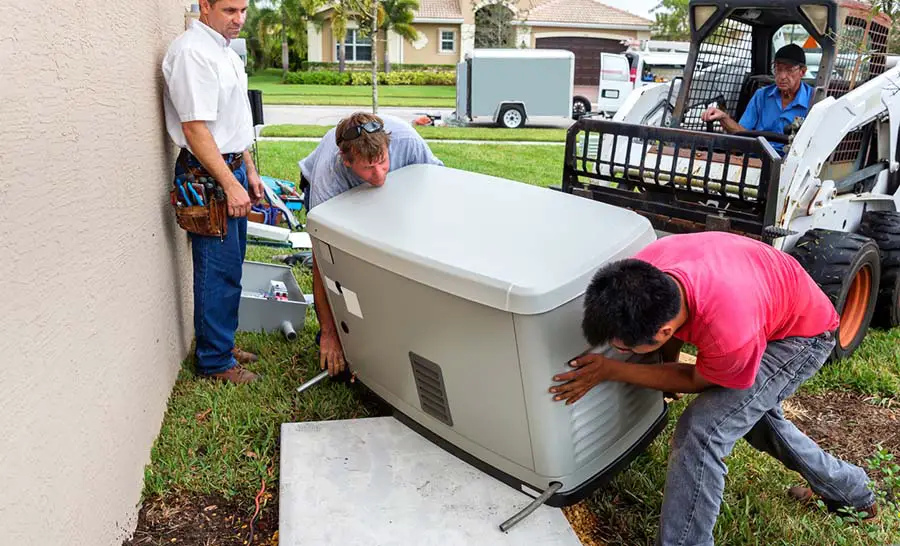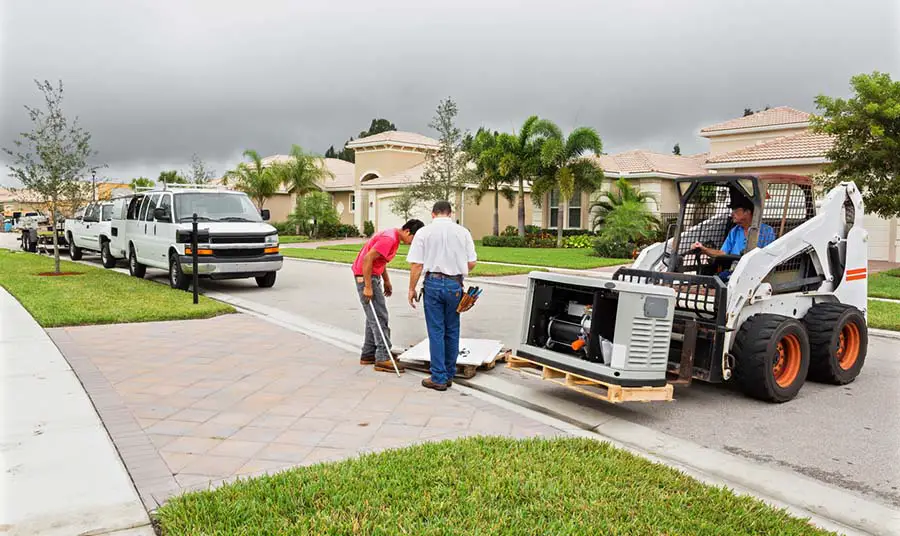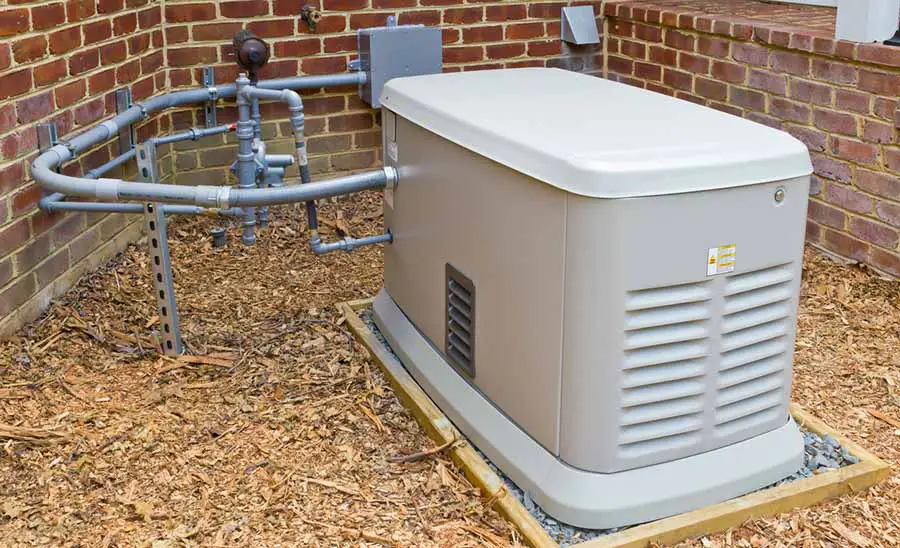
Whole house generators cost a fair amount of money, and some potential buyers are unaware that they need to include the cost of installation in the purchase price of the generator. The installation cost could be as much as the cost of the generator in certain instances where the installation is difficult to perform. Nevertheless, installing a whole house generator provides the owner with an uninterrupted power supply, even when the primary power supply grid decides to leave you in the dark.
Whole house generators cost anywhere between $2,000 to $15,000+, and installation usually costs an additional 75% on top of the generator’s price. The exact cost of a whole house generator depends on your home’s power needs, the type of generator you choose, and installation and permit costs.
When buying a whole house generator, you may decide on a natural gas model, which will make sense if a gas line runs through your property. Diesel, gasoline, propane gas, natural gas, solar, and battery backup systems are your other options. All of them vary in price and power output.
Before investing in a generator, the most crucial decision you have to make is whether you want full power functionality or essential power for selected appliances.
How Much Does a Whole House Generator Cost?
Whole house generators (7500 W to 48000 W) can start from $ 2,000-$ 16,599 depending on the unit’s power and fuel type. Generac generators are a well-known and trusted brand in the whole house generator market. They generally produce generators that run on natural gas or liquid propane, and they do have some excellent diesel options for bigger homes.
Below is a list of prices of some of their natural gas and liquid propane models:
| Generac Models: Natural Gas or Liquid Propane (LP) | Wattage | Cost |
| PowerPact (8-circuit transfer switch, WIFI-enabled) | 7500 W | $ 2,050 |
| Guardian (16-circuit transfer switch, WIFI-enabled) | 10000 W | $ 3,050 |
| Guardian (16-circuit transfer switch, WIFI enabled) | 13000 W | $ 3,660 |
| Guardian (whole house switch, WIFI-enabled) | 20000 W | $ 4,950 |
| Guardian (whole house switch, WIFI-enabled) | 24000 W | $ 5,510 |
| Protector Series | 30000 W | $ 10,100 |
| Protector Series | 36000 W | $ 11,600 |
| Protector Series | 48000 W | $ 14,899 |
And some diesel generator models:
| Generac Models: Diesel | Wattage | Cost |
| 1) Protector Diesel | 15000 W | $11,300 |
| 2) Protector Diesel | 20000 W | $12,500 |
| 3) Protector Diesel | 30000 W | $14,400 |
| 4) Protector Diesel | 48000 W | $16,599 |
Natural Gas Whole House Generators
Natural gas generators cost between $2,000-$6,000 for models able to supply power from 7500 W – 24000 W. When you buy one of these models, it will be installed to your home’s existing gas line and require no fuel storage.
Should you require more power, the cost will be between $10,000-$15,000 for models with a power capability of 30000 W-48000 W. Natural gas will be cheaper than diesel or liquid propane. These generators rely on gas pipelines that could be shut off or damaged during intense storms.
Liquid Propane Whole House Generators
Liquid propane generators cost between $2,000-$6,000 for models with a power capability between 7500 W – 24000 W. Should you require more power, the cost will be between $10,000-$15,000 for models with a power capability of 30000 W-48000 W. Liquid propane burns cleaner than other fuels and lasts longer; the main drawback is that it will require a large storage tank. This added requirement will increase the installation cost.
Diesel Whole House Generators
Diesel generators cost between $3,000-$17,000 for models that start between 7500 W-48000 W. Diesel generators are more expensive as they are built with heavier components and thicker metal due to higher cylinder pressure. Their power output is the strongest of any other generator type, and they run on cleaner energy which makes them more efficient than propane or natural gas generators.
Solar Panels
The cost of a 6000 W system will typically range from $12,000-$14,652. The current solar panel cost is $3,00 per watt of solar installed. Solar panels are costly, and generating enough power for a whole house will be an expensive exercise.
However, sustainability is a massive benefit, and it does not require constant refueling as generators do. The ability of solar panels to generate power can be affected by adverse weather conditions, and smaller units struggle to store ample energy.
Battery Backup Systems
Fuel-based generators are not your only option when it comes to generating power for your home. Many people are installing home battery backup systems, such as Tesla’s Powerball. These batteries run and store energy from the electrical grid, and they cost between $10,000-$20,000 for a medium-sized home.
Solar-powered batteries are even more expensive, typically ranging from $20,000-$40,000, while backup systems that rely on a merger of solar, battery, and fuel can cost as much as $50,000.
Tesla’s Powerwall is a lithium-ion battery power storage system with a max output of 7000 W (one Powerwall) and reduces your reliance on the power grid.
- One Powerwall battery will cost you $7,500, and the Gateway program and installation will cost you $4,500.
- The cost of installing the energy management system, Gateway, and the general cost of the installation decrease when you install more battery packs. When you install two Tesla batteries, the Gateway and installation cost will drop to $4,000, and so on.
- When combining the Powerwall with Tesla solar panels, you will receive a $1,500 discount. The more Powerwall’s you install, the bigger the discount.
Installation Cost for a Whole House Generator

The cost of installation is a cost that frustrates potential buyers. How is it possible that the generator’s cost can sometimes be equal to the cost of installing it? A safe way to work out the installation cost is to add 75% of the generator’s price to the total.
If you paid $10,000 for the generator, then the installation cost could be $7,500, that is to say if there are no electrical upgrades required before installation. Whole house generators need to connect to your home’s existing wiring. If the wiring needs to be corrected, should installing a subpanel and re-wiring be necessary, it could cost you an additional $500-$900, depending on the electrician.
Some homeowners balk at these installation prices and decide to install the generator themselves. Unless you have electrical expertise, it’s recommended that you leave the installation to the professionals.
Whole house generators require advanced electrical wiring and secure gas hookup. Any error made during the installation process can cost you a lot of additional money to fix and create a hazardous situation that could be life-threatening.
What Is the Average Cost to Install a Whole House Generator?
The installation cost will increase depending on the size and fuel type of the generator and the complexity of the installment process (distance from the electric box and the gas meter, and whether there are additional upgrades needed.)
According to Home Guide, the following averages apply:
| Priced for Generators 13000 W-22000 W | Cost |
| National Average | $8,000 |
| Minimum Installation Cost | $3,000 |
| Maximum Installation Cost | $22,000 |
| Average Installation Cost | $6,000 |
| Typical Installation | $3,000-$5,000 |
| Complex Installation | $5,000-$12,000+* |
*For installations of generators bigger than 20000 W, and more extended distance installations.
Why Is Installing a Whole House Generator So Expensive?
Let us look at the actual amounts charged when installing; hopefully, this will put your mind at ease when you need to make the payment. The cost is not just a made-up number by the professionals involved in the installation process!
| Service Rendered | Cost of Service |
| Electrician installing the generator | Contractors charge between $60-$100 per hour. Installing a generator could potentially take 6-11 hours. |
| Plumber installing gas lines. | Plumbers charge similar rates of $60-$100 per hour. Installing the gas lines usually takes 3-5 hours if it’s a typical installation; expect to pay more if it is a complex installation. |
| Transfer Switch | When your generator doesn’t come with a transfer switch, you must purchase one and install it. A transfer switch could cost you $400-$800 for a manual switch and $400-$2,000 for an automatic switch (depending on the wattage of your generator). The installation cost will be $400-$1,300 for a manual switch and $600-$2,500 for an automatic switch (including labor). |
| Concrete Pad | This pre-cast concrete pad is required for your generator to rest on and costs between $150 and $400. |
| New Propane Tanks (320-1000 gallons) | If you install a liquid propane generator, you will have to buy a new tank in most cases. A new propane tank will cost you anywhere between $1000-$2500. A refurbished tank will cost you between $600-$1700. Some dealers offer free tanks if you agree to buy a minimum amount of propane from them. |
| Security Cage | The security cage is optional and will generally cost between $300-$700. The cage is there to protect your investment and is an option that needs consideration. |
| Subpanel And Wiring | Installing a generator to your home’s existing wiring needs to be ultra-safe. If the wiring needs sorting out, and there is a need for a subpanel to be installed, you will be looking at $500-$900. |
| Gas Line Installation | Natural gas and liquid propane generator installations require that a fully licensed professional do the gas plumbing. The cost per linear foot is between $12-$25. |
| Plumbing, Electrical, and Mechanical Permits. | Depending on the local regulations in your area, you may need individual permits for plumbing, electrical, and mechanical work done during the installation process. These permits can cost you between $80-$450 on average. |
| Cold-Weather Kit | If you are resident in the northern half of the U.S., you need to buy a cold-weather kit for approximately $150-$500.The cold-weather kit ensures that the generator will start when temperatures drop below freezing. |
| Smart Load Manager | This device allows smaller generators to stabilize the electric load and provide energy to additional appliances. The smart load manager costs $130-$250. |
| Fascia Kit | The fascia kit protects the bottom of your generator against mice, rats, and other rodents as well as insects. The kit will cost you $60-$130. |
| Wireless Monitor | The wireless monitor costs $190-$210 and allows you to check the status of your generator from inside your house. |
What Is the Fuel Cost for Whole House Generators?

As you have probably noticed by now, generators are an expensive exercise. Purchasing a generator is money well spent at the end of the day. Unfortunately, your new generator requires fuel to work, so let us determine how much this will cost you.
Liquid Propane
- Liquid propane generators will need between 20-75 gallons of fuel per day, depending on the power requirement for your home. The average price for a gallon is $1,85-$3. The cost for running your liquid propane generator will range from $50-$150 per day.
Diesel
- Diesel generators produce the most power. However, they are pretty efficient when it comes to fuel usage. Running on a full load (20000 W) will roughly consume 1.6 gallons of diesel per hour. The selling price of diesel is approximately $3 per gallon. That works out to about $4.8 per hour and $115 for a full day’s work.
General Maintenance
Whole house generators need maintenance regularly. You need to perform oil and filter changes periodically to ensure maximum performance and durability.
- DIY maintenance kits will cost you $20-$110, and you do the maintenance yourself.
- An annual maintenance contract will cost $200-$650 per year and includes oil and filter changes and a full generator inspection.
How to Calculate Your Home’s Power Demand
It is recommended that you get a professional electrician to calculate the confirmed wattage needed for your house. It is possible to get a guesstimate yourself, and by using a wattage calculator, you should get pretty close to the exact wattage required for your house.
Follow these three steps, and you will get the best estimate:
- Make a list of all the appliances that will need power in the case of a power shortage.
- Establish the starting and running wattages of all the appliances on the list.
- Starting wattage refers to the amount of power it takes to start an appliance (it usually takes about 3-5 seconds). It is also known as “surge wattage” and is generally 2-3 times higher than the appliance’s running wattage.
- Running wattage is the amount of power an appliance needs to run continuously.
- Add all the appliances wattages (running and starting) together, and you will get an idea of what size generator is required.
Let us look at an example below of how to calculate wattage:
| Appliance | Starting Wattage | Running Wattage | Total Wattage |
| Central AC (10,000 BTU) | 4500 W | 1500 W | 6000 W |
| Sump Pump | 2150 W | 1050 W | 3250 W |
| Heat Pump | 4500 W | 4700 W | 9200 W |
| Garage Door Opener | 2350 W | 875 W | 3225 W |
| Coffee Maker | 0 W | 1000 W | 1000 W |
| Deep Freezer | 1500 W | 500 W | 2000 W |
| Refrigerator | 2200 W | 700 W | 2900 W |
| Water Dispenser | 0 W | 100 W | 100 W |
| Washing Machine | 2250 W | 1150 W | 3400 W |
| Desktop Computer | 350 W | 100 W | 450 W |
| Laptop | 0 W | 50 W | 50 W |
| Microwave | 0 W | 1000 W | 1000 W |
| Internet Router | 5 W | 15 W | 20 W |
| Cellphone Charger | 0 W | 25 W | 25 W |
| Security System | 0 W | 500 W | 500 W |
| Light Bulb (LED) | 0 W | 9 W | 9 W |
| Total Wattage | 19805 W | 13274 W | 33079 W |
In the above example, this person wants the above appliances to work should the power cut out. Adding the starting wattage with the running wattage, we get to the minimum wattage that the generator will need to produce. In this case, this client will need to buy a generator capable of producing 34000 W.
When power is needed to power some essential appliances or your whole house, generators usually start at about 7500 W and can go as high as 100000 W for residential models. For most homes, a unit that can produce 30000 W is sufficient.
Another yardstick that you can follow to measure your homes power requirement is the following:
- Essential power will require 3-5 watts per square foot.
- Full power will require 6-14 watts per square foot.
The Type of Generator and Power Output
The type of generator will influence the cost of a whole house generator. The type of generator refers to the fuel that it uses to function. Generally, diesel generators are the most powerful, and as a result, the most expensive. Here is some information regarding power output and price ranges for different types of generators.
The most crucial factor to consider when determining the whole house generator cost is the power capacity of the unit. Should you purchase a generator that does not meet your power requirements, it will put unnecessary stress on the unit and even cause damage to the devices connected to it.
If you are still wondering how much power you require for your home, please have a look at the following guidelines:
| Power | Total Power | Essential Power |
| Generators up to 15000 W | For homes that are 2500 sq. Ft. | For homes that are 5000 sq. Ft. |
| Generators from 15000 W – 30000 W | For homes that are 5000 sq. Ft. | For homes that are larger than 5000 sq. Ft. |
| Generators larger than 30000 W | For homes that are larger than 5000 sq. Ft. | N/A |
Why Do You Need a Whole House Generator?
Generating power will always be more expensive than using energy from the primary power supply grid. According to Generac research done between 2018-2020, 58% of power outages were due to heavy storms, and only 2.4% were due to planned outages. What do you do when there are constant power outages in your area? You start looking at alternative power options.
Generators are an expensive one-off purchase, and the running costs can also hit your pocket, but what are your other options when your household or business needs electricity, and there is none? On the positive side, a decent generator could last for 10- 20 years if you perform regular maintenance, making the initial investment worthwhile in the long run!
Before you start looking at generators, you should get an idea of what your home’s power requirements are:
- Essential power: You only need a certain amount of energy for some essential electric elements to function.
- Full power: You don’t even want to notice when the power grid powers out. You are looking for a generator that keeps your whole house running.
Conclusion
Purchasing a whole house generator is the right decision if you live in an area heavily affected by power outages and if the weather constantly interrupts your home’s power supply. It will be expensive, and the costs will accumulate, but you will be grateful in the long run.
One of the crucial things to do before you buy anything is to ensure that you know how much power is needed, either a few essential appliances or your whole house; it does not matter. Get a professional to do the assessment or calculate the wattage required yourself.
The best advice is to invest in a generator that provides more power than one that will struggle to supply the power demand required. Choose the best unit, even if it cost a little bit more.
Remember to add the installation cost to your generator’s purchase price. To leave room for unexpected expenses, multiply the unit’s price by two, and you can budget for the worst-case scenario. Installation cost could be less than your generator or pretty much the same price considering all costs involved in the installation process.
If you have no electrical experience, don’t try to install the generator yourself. It is the type of job that is better to leave to the professionals.

